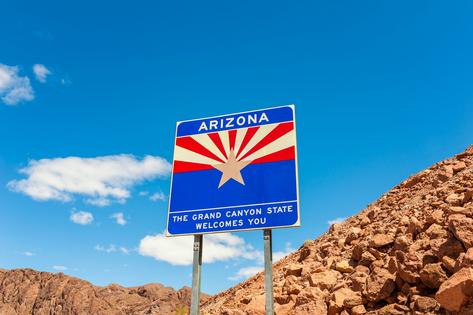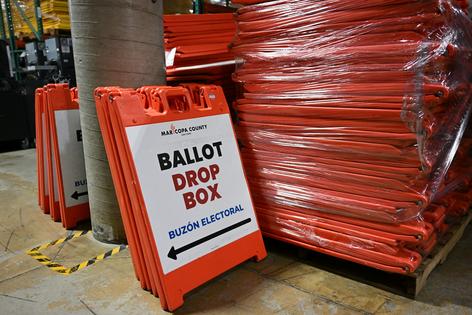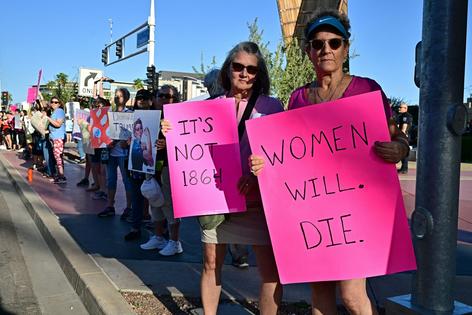Who will win in Arizona in November? It’s a toss-up − like it has been for years
Published in Political News
Arizona is considered a crucial swing state that could help propel either Donald Trump or Kamala Harris to the White House in November 2024.
With the exception of Democrat Bill Clinton’s win there in 1996, Arizona has voted Republican in every presidential election from 1952 through 2016. Democrats won the presidential election there in 2020, but Joe Biden narrowly defeated Trump.
It wasn’t always this way. Before the 1950s, campaigning in Arizona was a relatively simple matter for candidates such as Carl Hayden, a Democrat who served as a U.S. senator from Arizona from 1927 to 1969.
“Oratory wasn’t a big thing. I just told them I was a Democrat,” Hayden said in 1971.
In the 1950s, the party balance in Arizona began to change for a number of reasons, including demographic shifts. This era ushered in a more competitive two-party system in Arizona, giving Republicans an upper hand.
During this decade, more Republicans moved from the Midwest to Arizona, disproportionately settling in the Phoenix area, in Maricopa County. Conservative Democrats in the more rural areas of Arizona also gravitated toward the Republican Party as the Democratic Party became more liberal and they felt more aligned with conservative Republicans.
Other factors were at play – such as the influence of the state’s leading newspapers, The Republic and The Gazette, which were led by newspaper publisher Eugene Pulliam in Phoenix. Pulliam wanted to create a two-party state, and the newspapers’ editorials reflected this by publicly endorsing Republican candidates.
Arizona’s Republican Party came to power as a business-friendly and reform-minded party, eager to reform the state’s tax structure and increase spending for education and other social programs. This mirrored the relatively moderate Main Street Republicans across the country at the time. The party, though, also had a conservative populist and fundamentalist religious faction, which would grow in subsequent years and become more influential.
Since 1966, Republicans have controlled the state’s House of Representatives and have lost control of the State Senate on only a few occasions. While Republican dominance in the state legislature has declined in recent years, Republicans continue to control both bodies. They also currently have six of the nine congressional seats.
Arizona’s governor, Katie Hobbs, is a Democrat but the first Democrat in several years to hold the office.
Today, Republicans currently outnumber Democrats in terms of party registration in Arizona – 35% to 29%, with 34% classified as independents or unaffiliated voters and the rest listed as Libertarian or affiliated with the Green Party.
At the same time, Arizona qualifies as a swing state because Democrats have, indeed, done well in recent statewide elections, showing an increasing amount of strength, often, though not always, outdoing the Republicans. In 2018, Democrats won statewide races for U.S. senator, secretary of state, superintendent of public instruction and a seat on the public utility corporation commission.
In 2020, Arizona voters elected another Democrat to the U.S. Senate, Mark Kelly, following Sen. John McCain’s death in 2018. And Biden defeated Trump in the state.
In 2022, nearly all the candidates nominated by Republican voters for statewide office took the public – and false – position that the presidential election had been stolen from Trump. Some of these election deniers won their primaries with Trump’s endorsement and went into the general election with his backing.
But Republicans lost the important statewide offices of U.S. senator, governor, attorney general and secretary of state to the Democrats.
Democratic candidates in Arizona have done particularly well in recent years with women, minorities – including Latinos, Black people and Native Americans – young people and independents. They have also gained the support of some moderate Republicans who are unhappy with more extreme Republican candidates.
Democrats have also benefited from the migration of more liberal people from California over the past few decades, an increase in the size of the Latino vote and greater support from college-educated women in suburban areas.
There is no single issue driving these voters, who are concerned about everything from reproductive rights and immigration to education and the economy.
Democratic success has rested on votes in the largest urban counties of Maricopa and Pima, both of which have been growing. This is especially true of Maricopa, which has grown significantly over the past few decades.
Republican candidates have done well with rural voters. These voters tend to be more conservative on economic issues involving government taxing and spending and on social issues, where their views often reflect evangelical religious beliefs on matters such as abortion and LGBTQ+ rights.
Rural votes have been decisive in some elections, pushing Republicans to wins when urban voters have been badly divided on candidates and issues such as immigration.
If Arizona can be considered a purple state, moving from Republican red to Democratic blue, it is largely because Maricopa County, where more than 60% of the state’s total votes come from, has a mix of Democrats and Republicans.
Change has been especially apparent in recent elections in suburban areas in the counties with wealthier and well-educated populations. Other important counties, including Pima, have not changed all that much in their partisan leanings over the past few decades.
Arizona has shown signs of changing from a Republican stronghold and may be properly ranked among those states most likely to qualify as a swing state. But this, in itself, tells little about how it is going to swing in any given election. Much will depend on the issues and personalities involved.
Democrats hope that an Arizona ballot measure on abortion that voters will decide on in November will generate voter turnout favorable to them. The measure would protect the right to have an abortion up until fetal viability, typically up until 23 to 24 weeks of pregnancy.
Republicans hope another ballot measure that would make it illegal, under state law, to cross the border without a visa could help win them votes.
Polls suggest Arizona voters are most concerned about jobs and the economy, immigration, and government taxing and spending. Compared to voters in other swing states, they appear especially concerned about immigration. Republicans seem particular fixated on these issues, while Democrats have a more diverse set of concerns, including, in 2024, abortion rights and preserving democracy.
In November, Trump is likely to do well in Arizona on the immigration issue but poorly on the abortion issue. For Harris, the opposite is true – though she has gotten the endorsement of some Republican mayors in Arizona border towns.
Putting Harris on the ballot in place of Biden has rejuvenated the Democrats. Polls suggest she has had greater appeal to women, young voters, independents and Latinos and could cut into Trump’s narrow lead.
Overall, there is the possibility of considerable change in voter sentiment as the election campaigns unfold. Arizona is a state that can go either way.
This article is republished from The Conversation, a nonprofit, independent news organization bringing you facts and trustworthy analysis to help you make sense of our complex world. It was written by: David R. Berman, Arizona State University
Read more:
Some states’ populations are very much like the US overall – including 5 key states in the 2024 presidential election
Wisconsin is a key swing state this year – and has a history of being unpredictable
Pennsylvania continues tradition as ‘keystone state’ in presidential elections
David R. Berman does not work for, consult, own shares in or receive funding from any company or organization that would benefit from this article, and has disclosed no relevant affiliations beyond their academic appointment.




































































Comments